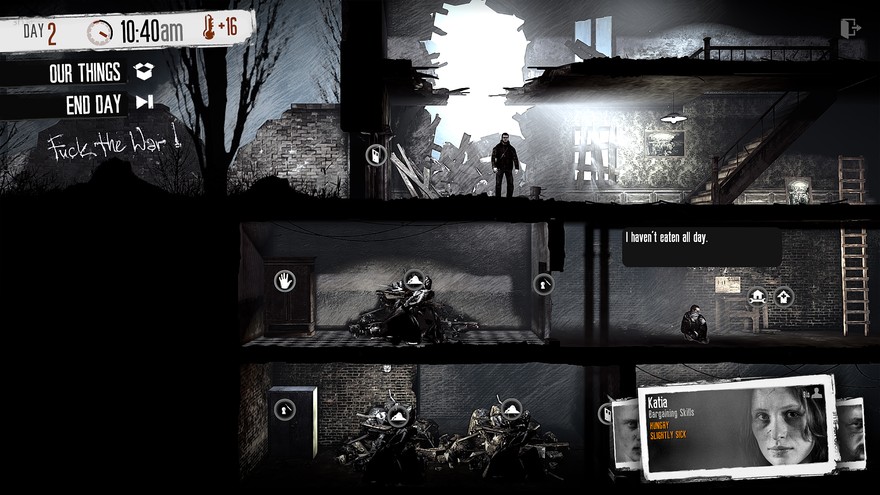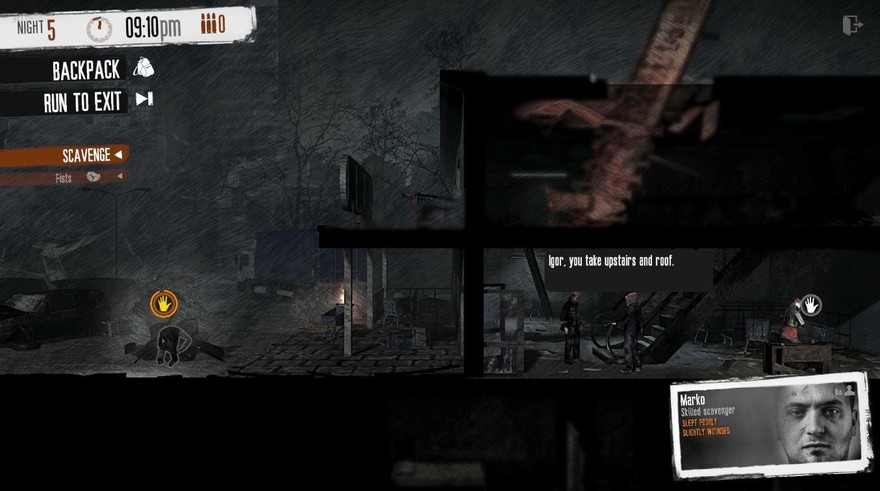Survival necessitates routine. Daily life demands a certain degree of scheduling almost as a biological imperative, and for the bedraggled denizens of This War of Mine, a war game about civilians trapped in a war-torn city, the regularity of a schedule is all they have. It’s a means to mark time between the distant rumble of explosions and muted gunfire, the absence of which most of us take for granted as we perform our regular schedules. As such, I thought it best to tell their stories as they live them: day-to-day.
Day One
I meet Bruno (a decent cook), Pavle (a man quick on his feet, hampered by a wound), and Marko (a skilled scavenger, slightly ill) in a dilapidated building consisting of three floors, a basement, and a crumbling outside wall with the words “Fuck the War!” crudely scrawled across its charred stone. The stark, black and white aesthetic paints the scene with ashy, charcoal affectation. I directed each to clear out different piles of rubble to more easily access cupboards and closets that may hide supplies. With what they found, Bruno built a crude bed just before the sun went down.
That night, I sent Marko to scavenge what he could from a nearby house while Bruno slept and Pavle stood watch. It was empty and yielded useful items. Marko’s pack could only hold fifteen items, so I had him take some wood, herbs for medicine, and food. He left a cache of shell casings and gun parts. I didn’t think the group needed weapons, at least not yet. He came home with a decent haul.
Day Two
When the sun rose, little had happened at the homestead that warranted an update. Bruno slept; Pavle watched. Each civilian was hungry, so they ate from the place’s limited food stores. Without a stove, raw produce and canned slop provided barely enough to fight off the hunger. Pavle slept while Bruno built another bed and a workstation that allowed for more crafts, like the crowbar that Marko used to break through a particularly stubborn door. Bruno worked all day while Pavle and Marko and traded sleep shifts.
After the sun went down, I sent Marko to a different house to pillage for food. Unfortunately the house was already occupied. A man who wanted to barter for food asked for help that Marko couldn’t offer. I had Marko comb the house while the man wandered across its floors, pestering Marko for food he didn’t have before giving up. As Marko left, his pack filled with only wood and machine parts, the man asked him to return with food. I didn’t send anyone back.

Day Three
When Marko returned, I found out that the homestead had been sacked. Pavle and Bruno fought them off, but both ended up wounded in the altercation. If only I’d had the foresight to repair the gun. The group had lost blood, supplies, and clearly morale. The wounded limped to their daily tasks. Bruno slowly built a stove that he then used to cook two meals from the food they had left. Pavle used the last bandages to dress his wounds. Marko slept in preparation of his nightly excursion.
Marko went out to another building that night. Its occupants, however, were more protective of their stores than the one Marko had previously encountered. Marko spent the night hiding in darkened corners to avoid patrolling civilians while looting their supply cabinets and closets, until too much noise drew their attention. Bolting away from the house, Marko caught a bullet from a rifleman perched on a crumbling balcony. He limped home with his pack unfilled.
Day 4 and After
Nothing of note happened in the homestead that night, but they had neither bandages nor medicine to treat injuries. The food supplies, too, dropped dangerously low. Still, the band of survivors fought on, and I felt further and further removed from the actions. The longer I spent among the survivors, the more I noticed how the monotonous daily routine of cook, heal, build, rest, fix, scrounge, then head out into the night attains a sort of systematic tiresomeness reflected in the bedraggled characters and dilapidated house on screen. The characters didn’t seem to have a purpose other than to complete their routines, turning their daily struggle into a zombified pantomime of survival instead of a driven need to fight on. If This War of Mine has a more human face, however, it decays with each turn, as the character’s gradually become husks of their former selves.

Then again, perhaps that’s the point of This War of Mine: to make us confront monotony as a simultaneous bastion of normalcy and dehumanizing system of repetition. After playing this round I moved my mouse to the exit menu which confronted me with the option to “Surrender” or “Resume Game”—a final twist of the knife from a guilt-inducing text.
